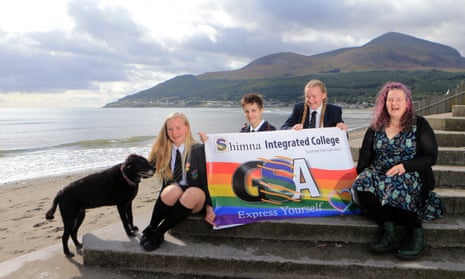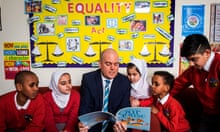David, 15, sporting a Goth-style haircut, is explaining how support at secondary school helped him come out as gay and how the school is a comfortable place for LGBT students. “In primary school, and even in my first year here, I got called ‘gay’ or ‘fruit’ quite a lot,” he says. “A lot of the kids learn these attitudes in primary school.”
David’s school, Shimna integrated college, under the shadow of the Mourne Mountains in Newcastle, Co Down, set out to eradicate such homophobia. It has a Gay Straight Alliance (GSA) group, developed after an English teacher, Shirley Anne McMillan, heard about the GSA groups in US schools. David explains: “What we have been trying to do is change attitudes from when people first come here, so what happened to me doesn’t happen to others.”
Outside school, though, homophobia persists. “You get abuse on the streets from bullies, but at least I can come into Shimna, meet up with the GSA group or the school staff, and talk through what I have to put up with out there.”
Shimna is doing its best to promote equality but it may be in the minority, and life for most LGBT children at school in Northern Ireland still seems tough. A report on LGBT students’ experience commissioned by Northern Ireland’s education department, published last week, reveals that two-thirds of LGBT pupils did not feel welcomed in Northern Irish schools.
Only just over half of gay students felt able to come out. A quarter of the 532 pupils interviewed said they had spoken to no one about their sexuality. More than half had had negative experiences in school and felt isolated. Some 54% of those who reported bullying felt “very unsupported” or “unsupported” by the member of staff they told. One said: “I had teachers call me names like sissy and pansy and was singled out by one teacher who compared me to a plague.”
When it comes to sex education, the report says: “The participants felt that the relationships and sexuality education which was provided either ignored the needs of LGBT young people or actively advocated against their interests.” Heteronormative language is usual, which makes many children feel lonely and isolated. More than 38% of respondents said their teachers use inconsiderate or derogatory language. “Homophobic comments can be made without consideration that there may be members of the LGBT community in the class,” said one student. Another said: “I asked the teacher if we would learn about LGBT+ in biology and they said that everything you need to know will be found in gay/lesbian porn.”
For 19 months the Department of Education sat on the report. Its findings were handed to the last regional education minister, Peter Weir of the Democratic Unionist party, as far back as March 2016. After inquiries from media organisations, including Education Guardian, the department eventually released its results this month. It has issued no new guidance for schools following the report.
The Rainbow Project, one of Northern Ireland’s gay rights organisations, says the report demonstrates there is “institutional anti-LGBT bias” in the education system. Gavin Boyd, the project’s policy officer, says that while a number of schools are doing their best, he is deeply concerned about the lack of coordinated or widespread support for LGBT children. “There are examples quoted in the [government] report of teachers and staff making homophobic comments; of anti-gay verses in the Bible being read out to classes,” says Boyd. “It is our belief that such practices are in breach of the Human Rights Act because the scale of the homophobia is still unprecedented.”
Northern Ireland is the only part of the UK where LGBT couples cannot legally marry, mainly owing to the opposition of the Democratic Unionist Party and other unionists who have consistently vetoed moves in the now deadlocked Stormont Assembly to legalise gay marriage.
Another report, published in August by the education department, revealed that many schools do not teach about homosexuality in sex education lessons (which are compulsory in the province). Some 59.2% of schools said that they did not cover LGB issues, while only 21.4% said that they did. A further 19.4% preferred not to say.
The Northern Ireland Humanists group accuses some schools of “passing the buck” over their responsibilities to protecting LGBT pupils. Its spokesman, Boyd Sleator, says schools are using the religious character of their institutions as an excuse to avoid a proper duty of care to students.
“It is completely unacceptable that so many schools are failing to provide any information on LGBT issues to their students, and there can be no excuses,” he says. “Some excuse themselves by saying they do not engage in any explicitly discriminatory teaching, as if somehow that absolves them of the responsibility to include or treat LGBT people equally. Some schools say that they don’t have any LGBT pupils so teaching about LGBT issues is unnecessary.”
He adds: “Failing to teach about LGBT issues can cause just as much damage as overtly anti-LGBT teaching, and the government needs to communicate this far more clearly. Schools cannot be allowed to believe that they can get away with this unequal treatment any longer.”
Schools are covered by the Equality Act, and the province’s Equality Commission has issued guidance to them. They may teach sex education in a way that “is in conformity with the moral and religious principles held by parents and school management”. But, it continues: “If a school conveys its belief in a way that involved haranguing, bullying or berating a particular pupil or group of pupils then this would be unacceptable and might constitute unlawful discrimination.”
The Boys’ Model school in north Belfast, an area where every lamppost is adorned with loyalist paramilitary emblems, is another that has taken assertive action to support its LGBT students. Jamie, 14, describes to the Guardian how a friend stood up for him when he was bullied on a bus. “My straight friend intervened and told the lad to stop it. He told him that at Boys’ Model we don’t accept that kind of behaviour. It made me feel that I could say I am gay. I was no longer afraid afterwards to admit who I am. It was that incident and the way our school deals with this that helped me come out.”
The school has 14 ambassadors and its own restorative justice programme. Callum, aged 16, is a volunteer for the project. He acts as a mediator between pupils accused of homophobic abuse and those on the sharp end of it. “We have a special email which anyone who thinks they are bullied can reach us and tell us about their problems. Once we speak to them and hear who has been giving them a hard time, we offer the boy behind it a chance to change.”
One of the teachers behind the project, Judith Blair, says all staff are supportive of the project, which began 12 years ago when one boy went to her to talk about his sexuality. “He found he could talk to no one about it and was terrified to come out, especially to his peers. It was then I realised we had to do something to make boys like him feel comfortable at school.”
Students’ names have been changed







Comments (…)
Sign in or create your Guardian account to join the discussion